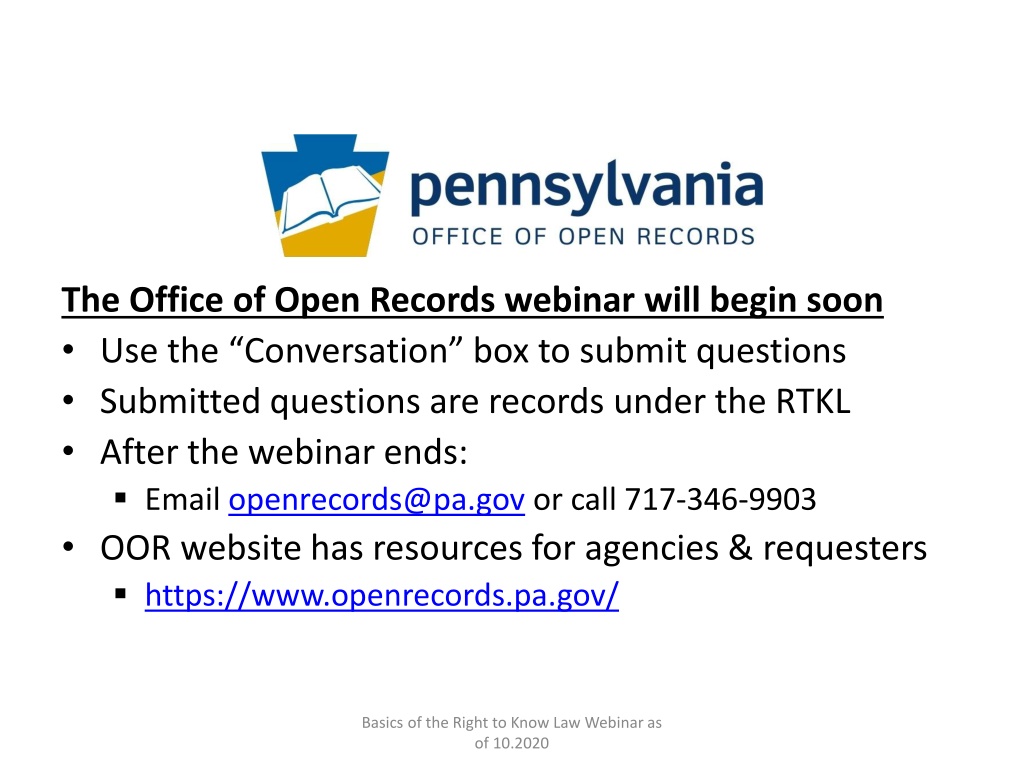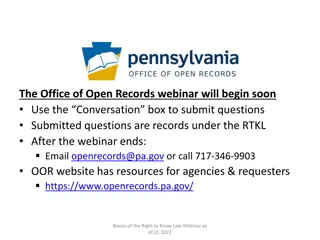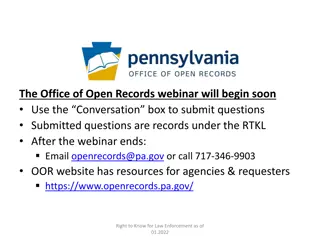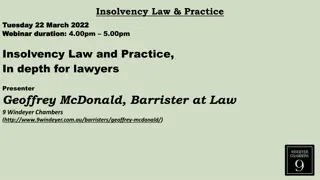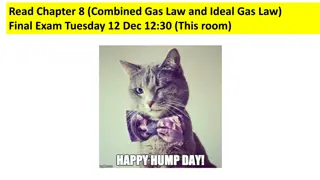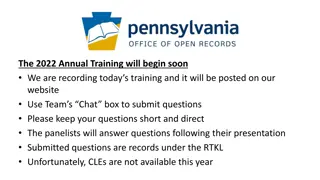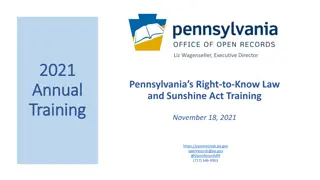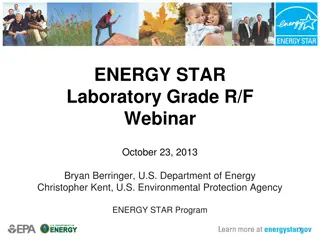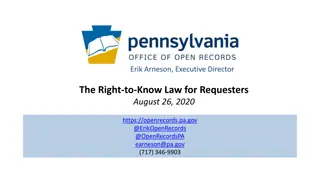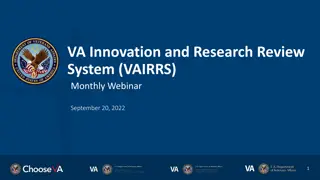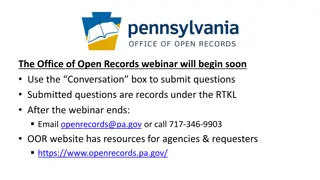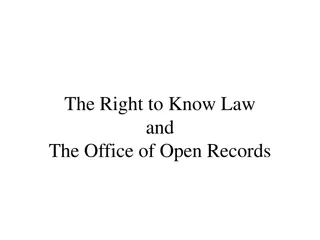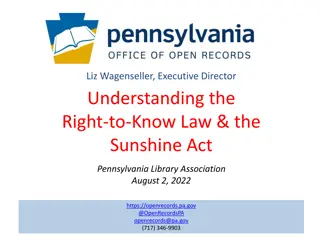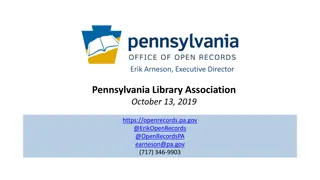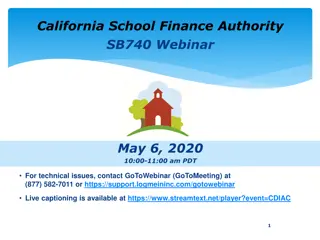Basics of PA Right to Know Law - Webinar Overview
Explore the key elements of Pennsylvania's Right to Know Law through an in-depth webinar covering agency obligations, prohibitions, and definitions of records. Learn about requesting records, agency responsibilities, and more.
Download Presentation

Please find below an Image/Link to download the presentation.
The content on the website is provided AS IS for your information and personal use only. It may not be sold, licensed, or shared on other websites without obtaining consent from the author.If you encounter any issues during the download, it is possible that the publisher has removed the file from their server.
You are allowed to download the files provided on this website for personal or commercial use, subject to the condition that they are used lawfully. All files are the property of their respective owners.
The content on the website is provided AS IS for your information and personal use only. It may not be sold, licensed, or shared on other websites without obtaining consent from the author.
E N D
Presentation Transcript
The Office of Open Records webinar will begin soon Use the Conversation box to submit questions Submitted questions are records under the RTKL After the webinar ends: Email openrecords@pa.gov or call 717-346-9903 OOR website has resources for agencies & requesters https://www.openrecords.pa.gov/ Basics of the Right to Know Law Webinar as of 10.2020
Erik Arneson, Executive Director Basics of the Right to Know Law Phone Number: 717.346.9903 http: //openrecords.pa.gov Basics of the Right to Know Law Webinar as of 10.2020
Agency obligations: Must appoint an Agency Open Records Officer ( AORO ). May promulgate regulations and policies necessary for the agency to implement the RTKL. May create your own Request Form, but must accept the Uniform Request Form developed by the OOR. Should provide the OOR with the name and contact information for your AORO Basics of the Right to Know Law Webinar as of 10.2020
Postings On your bulletin boards and if you have a website: Contact information for the AORO. Contact information for the applicable appeals office. A form to file a Request. Regulations, policies and procedures of the agency related to the RTKL. Basics of the Right to Know Law Webinar as of 10.2020
Prohibitions Section 1308 An agency may not adopt a policy or regulation which: 1. Limits the number of records which may be requested or made available for inspection or duplication; or 2. Requires disclosure of the purpose or motive in requesting access to records. Basics of the Right to Know Law Webinar as of 10.2020
What is a Good Request? It is addressed to the Open Records Officer It seeks a record It is Sufficiently Specific Basics of the Right to Know Law Webinar as of 10.2020
Definition of a Record: Any information regardless of its physical form or character that documents a transaction or activity of an agency AND is created, received, or retained pursuant to law OR in connection with a transaction, business or activity of an agency. Basics of the Right to Know Law Webinar as of 10.2020
Sufficiently Specific Subject must identify a transaction or activity of the agency for which the record is sought Scope must identify a discreet group of documents either by type or recipient Timeframe needs to be finite Basics of the Right to Know Law Webinar as of 10.2020
Receiving a Request Upon receipt, AORO shall: note the date of receipt on the written request; Compute the date on which the five (5) day initial response period will expire and note that date on the written request; YOUR BUSINESS DAYS Maintain a copy of the Request until it is fulfilled; If denied, Request must be kept for 30 days or, if appealed, until the OOR issues the Final Determination. Basics of the Right to Know Law Webinar as of 10.2020
Extensions Agencies may unilaterally invoke a 30 Calendar Day Extension if: It is done within the initial 5 business day window It is done in writing to the requestor A reason is provided consistent with Section 902 A date is provided that the requestor can expect a response An estimate of costs is given. 5 + 30 application per Section 902(b)(2) Basics of the Right to Know Law Webinar as of 10.2020
Payment Issues Agency is only required to provide the record in the current medium Cannot charge for electronic records Must allow Requester to use their own equipment to make copies Cannot charge for labor/redaction/legal review Can only charge the actual cost/pass-through costs Basics of the Right to Know Law Webinar as of 10.2020
More Payment Issues ! No surprises. Contact the requestor with an estimate before the work starts. Mutual exchange, but payment is due first An Agency may require pre-payment if the fees are expected to exceed $100. Hold responses for 60 days before discard if not picked up. Denial for non-payment of previous requests Basics of the Right to Know Law Webinar as of 10.2020
Denying Access A denial must include: A description of the requested record The legal and factual grounds for denial Name, title, signature, business address and phone number of AORO Date of response The procedure to file an appeal with the applicable appeals office. Basics of the Right to Know Law Webinar as of 10.2020
The RTKL is not a confidentiality law Records can be released outside of the RTKL. An agency may exercise its discretion to make any otherwise exempt record accessible if: 1. Disclosure is not prohibited by Federal or State law or regulation; and 2. The record is not protected by privilege; and 3. The agency head determines that public interest favoring access outweighs any interest favoring withholding. Basics of the Right to Know Law Webinar as of 10.2020
Filing an Appeal If the agency denies or deem denies a Request, an appeal may be filed within OOR15 business days of the mailing date of the Agency s response or date of the deemed denial (whichever first). Basics of the Right to Know Law Webinar as of 10.2020
A Complete Appeal Includes the original Request Includes the Agency Response, if one is provided Includes your statement about why the requested records are public Includes a statement addressing any grounds cited by the agency for denying your request Basics of the Right to Know Law Webinar as of 10.2020
OOR Docketing Letter Use mailing date of letter to calculate 7 business day submission period. Affidavit is required to support facts. Communication to OOR must include the other party. Provide notice of appeal to relevant third parties. h Basics of the Right to Know Law Webinar as of 10.2020
Final Determinations Are issued within 30 days of receipt of an appeal unless Requester agrees to an extension. Are legally binding final orders. Available for review on OOR website, Lexis, and Westlaw Basics of the Right to Know Law Webinar as of 10.2020
Appeal Options: Mediation Either party may request mediation as an alternative to the traditional adversarial appeals process. If mediation is unsuccessful, the appeal is transferred to a different appeals officer for issuance of a final determination. Particularly effective where the Request is broad or covers a large number of records that are responsive to the Request, but which the Requester may not have intended to seek. Basics of the Right to Know Law Webinar as of 10.2020
Judicial Review Within thirty (30) days of the mailing date of an OOR Final Determination, any party may file a judicial appeal. 65 P.S. 67.1302(a). Local agency appeals are to be filed with Court of Common Pleas in the agency s county. Commonwealth agency appeals are to be filed with the Commonwealth Court. The OOR must be served notice of the appeal, but the OOR is not a party and should not be named in the caption. Basics of the Right to Know Law Webinar as of 10.2020
Additional Resources www.OpenRecords.pa.gov Citizens Guide Agency Guides Final Determinations and Key Court Decisions Open Records Officer Guidebook On Site Training = RA-DCOORTRAINING@pa.gov Twitter Feed = @OpenRecordsPa OOR Phone = 717.346.9903 Basics of the Right to Know Law Webinar as of 10.2020
